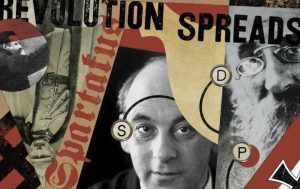Peter E. Gordon in The Nation:
 It was slightly more than a century ago, in November 1918, that revolution swept through Germany, bringing chaos to a country that, in the final days of World War I, was already in desperate straits and verging on collapse. Although it was obvious to nearly everyone that the war was lost, the fighting staggered on, even as a growing pacifist movement issued the cry for “Peace, Freedom, Bread!” In Kiel on the Baltic Sea, sailors at the docks refused the order for a last battle and went into open mutiny, while soldiers and revolutionary workers in Berlin called for a general strike. Kaiser Wilhelm II, an absurd and incompetent militarist, at last faced the truth that his time was up and abdicated the throne, leaving confusion in his wake. On November 9, Philipp Scheidemann, a member of the Social Democratic Party of Germany (SDP), seized the moment to declare the founding of a new republic.
It was slightly more than a century ago, in November 1918, that revolution swept through Germany, bringing chaos to a country that, in the final days of World War I, was already in desperate straits and verging on collapse. Although it was obvious to nearly everyone that the war was lost, the fighting staggered on, even as a growing pacifist movement issued the cry for “Peace, Freedom, Bread!” In Kiel on the Baltic Sea, sailors at the docks refused the order for a last battle and went into open mutiny, while soldiers and revolutionary workers in Berlin called for a general strike. Kaiser Wilhelm II, an absurd and incompetent militarist, at last faced the truth that his time was up and abdicated the throne, leaving confusion in his wake. On November 9, Philipp Scheidemann, a member of the Social Democratic Party of Germany (SDP), seized the moment to declare the founding of a new republic.
Because of the civil unrest in Berlin, the members of the fledgling government gathered to sign the new constitution in Weimar, a town some 300 kilometers to the southwest best known as the birthplace of German classicism. The Weimar Republic might have marked a peaceful transition—the founding of Germany’s first democracy. But the revolution was not finished. Just two hours after Germany had been declared a republic, Karl Liebknecht, leader of the anti-war Spartacus League, declared the founding of the Free Socialist Republic of Germany, a rival government that drew its strength from below and called for a shift in political power to the workers’ councils, following the model of the Russian soviets. The country lurched from monarchy to democracy not once, but twice.
More here.
